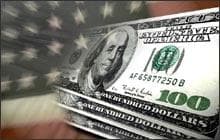Advertisement
More Tax Cuts
Resume Congress is set to pass a hefty $350 billion tax cut package tonight. Though $200 billion short of what President Bush was lobbying for last month, the administration is already calling the anticipated passage a victory for the President and the country. Critics warn the cuts will come at the expense of such social programs as Social Security and Medicare and further deepen the economic divide between the rich and the poor.
Congress is set to pass a hefty $350 billion tax cut package tonight. Though $200 billion short of what President Bush was lobbying for last month, the administration is already calling the anticipated passage a victory for the President and the country. Critics warn the cuts will come at the expense of such social programs as Social Security and Medicare and further deepen the economic divide between the rich and the poor.Robert Shiller, professor of economics at Yale University, believes that raising government expenditures, not cutting taxes, is the better way to stimulate the economy. He also argues that taxes should be progressive.
David R. Henderson, research fellow at the Hoover Institution, thinks that cutting taxes is a good plan for stimulating the economy because it will encourage investment, and with more capital available for labor, wages will increase, and everyone will benefit.
Click the "Listen" link to hear more about whether Bush's $350 billion tax cut will rev up the economy and create new jobs or simply mean more money for the rich and lead to greater economic inequality.
Guests:
Jonathan Weisman, economics policy reporter for The Washington Post
Robert Shiller, professor of economics at Yale University and author of "The New Financial Order: Risk in the 21st Century"
David R. Henderson, research fellow, Hoover Institution, and author of "The Joy of Freedom: An Economist's Odyssey"
Thomas Frank, editor, The Baffler, and author of the cover story in the June issue of Harper's, "Get Rich or Get Out: Attempted Robbery with a Loaded Federal Budget"
This program aired on May 22, 2003.